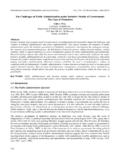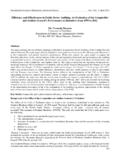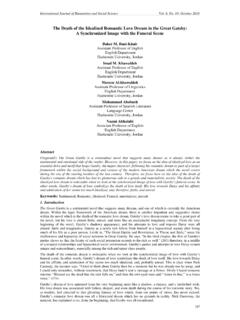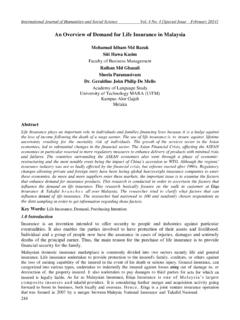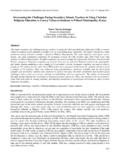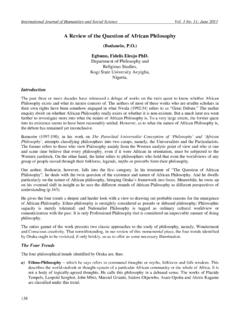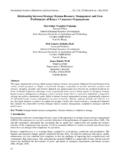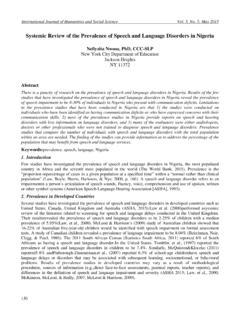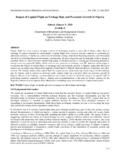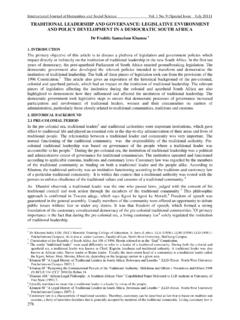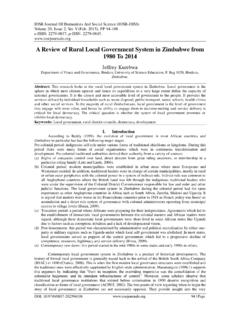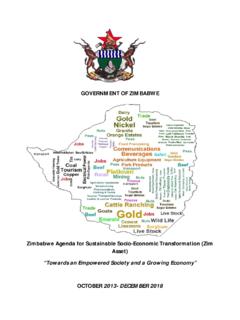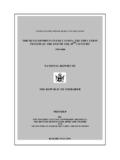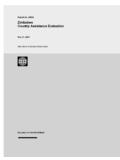Transcription of Implementing Results-Based Management …
1 International Journal of Humanities and Social Science Vol. 2 No. 8 [Special Issue April 2012]. Implementing Results-Based Management Systems in zimbabwe : Context and Implications for the Public Sector Alois Madhekeni Lecturer of Public Administration Department of Political and Administrative Studies Faculty of Social Studies University Of zimbabwe Mp167 Mt Pleasant Harare, zimbabwe . Abstract The article focuses on the introduction of the new concept of Results-Based Management (RBM) in zimbabwe 's public sector. The major tenets of RBM are explored and examined against traditional implementation-focused public Management systems. The study investigated the benefits from RBM, problems being encountered and lessons from experience.
2 zimbabwe 's experience with a Results-Based Management programme has also been examined against global experiences from other countries. Documentary search and field research revealed that in addition to some epochs of progress the politics of administration, forces of patron-clientelism and rampant administrative and technical incapacity have been the major setbacks to the fruition of RBM. This revelation casts doubt on whether a proper readiness assessment was conducted before the initiative's introduction. On the contrary a review of literature indicates that although the implementation of a Results-Based Management system is easier said than done, it still remains an indispensable tool of effective public Management . Key Words: results , Outcomes, Results-Based Management , Implementation-Focused Management , Public Management , Accountability.
3 Introduction Countries across the globe are under pressure to reform the policies and practices of their public sectors. A. Results-Based Management (RBM) system is a powerful tool that can be used to help policy-makers and decision makers track progress and demonstrate the impact of a given policy, programme or project. The RBM system across the globe has been triggered by the growing concerns and pressure from both internal and external stakeholders for governments to provide more tangible and demonstrable results . Kussek and Rist (2004) assert that the Millennium Development Goals (MDGs), Highly Indebted Poor Country Initiative (HIPC), World Trade Organization Membership (WTOM), Transparency International (TI) and the European Union (EU) enlargement and accession are among the wide number of initiatives pushing and prodding governments to adopt results oriented Management systems.
4 The success story of the RBM system in developed nations led to growing pressures for developing countries to adopt the new system as a way of improving performance and upholding accountability. The Government of zimbabwe embarked on a multi-year program to design, introduce and successfully implement an integrated results based Management (RBM) programme across government. The RBM. programme comprises of a Results-Based Budgeting (RBB) system , Results-Based Personnel Performance system (RBPPS) and E-Governance. Cutting across all these three is an integrated results based Monitoring and Evaluation system (RBME) and a complementing Management Information system (MIS). The above systems are deemed critical to assist government in conducting systematic programme planning, formulation and implementation which in turn is expected to improve the performance of government's development initiatives.
5 The programme has been operational since the year 2005. The implementation of the programme in zimbabwe has been an area of controversy with regard to issues of applicability benefits and drawbacks more so in an environment where there are several institutional, organizational and systematic weaknesses negating Government efforts. Inspite of these assumptions, history has it that the RBM system , if properly implemented, can improve government performance. 122. The Special Issue on Contemporary Issues in Social Science Centre for Promoting Ideas, USA Conceptual Analysis Origins of RBM. The concept of RBME as part and parcel of Results-Based Management (RBM) is believed to have begun with Peter Drucker as Management by Objectives (MBO) and Program Performance Budgeting system (PPBS) in the 1960s and evolved into the use of logical framework for the public sector in the 1970s (Rassapan 2003: 02).
6 It was adopted by different countries in the 1980s and 1990s using different forms and names. Currently it has now developed into a proven and accepted approach for improved public sector accountability, effectiveness and efficiency. The concept has been adopted by all international donor agencies and the Zimbabwean Government introduced it in the year 2005. This background is expressed in the Government of zimbabwe 's Results-Based Management programme a document prepared by a Malaysian consultant. The Transition The difference between RBM and the preceding era of implementation- based systems lies in the scope, foci and loci of public sector Management . RBM focuses the public sector agency on tangible results to be delivered, clarifies programme clients and their needs/problems, and promotes systematic performance analysis and benchmarking to drive programme performance and improvement.
7 It emphasizes value for money from usage of limited resources, move agencies away from input-driven incremental budgets towards results -driven performance budgets, from workload and activity- completion personnel performance towards results -oriented performance and from activity and output- based monitoring to outcomes and impact evaluation. Unlike the business as usual . approach in the traditional implementation-focused systems, the results based Management system calls for institutions to take responsibility for their actions and demonstrate the impact of that action. It requires that organizations articulate how public funds will be spend on services and products that have an impact on people's lives, monitor how effectively and efficiently these programmes work, and take action to improve programme results .
8 Experiences from other countries The concept of RBM may be new in zimbabwe but very familiar and actually old in other countries where it has been implemented before. There are therefore a number of cases on RBM in both developed and developing countries which include the Republic of Korea, Australia, Malaysia and Uganda. Australia Australia is regarded as one of the early pioneers of RBM. According to Mackay (2002:29) the country had a number of intrinsic advantages conducive to building a strong Results-Based system . These include a strong human, institutional and Management capacity in the public sector, a public service known for integrity, honesty and professionalism, well developed budgetary and accounting systems, a tradition of accountability and transparency and credible legitimate political leaders.
9 Mackay (ibid) further notes that the system evolved from one of tight central controls imposed by the department of finance to a more voluntary approach across the public sector. This development is alleged to have led to an increased evaluation commitment and ownership. Currently issues like M&E in Australia are left to the individual departments and agencies. The formal requirements have been relaxed considerably and departments conduct it based on their own priorities whilst some Management practices continue to be mandated by the cabinet. Republic of Korea The concept of RBM in Korea is widely believed to be a product of the Asian economic crisis of the late 1990s which brought about new changes in Management practices. Lee (2002:194) outlines that the new Korean government asserted that the national economic crisis resulted from lack of efficiency in public sector Management .
10 This assessment became an opportunity for reinventing government. M&E systems included surveys of public satisfaction with major government policies, programs and projects. Lee (ibid) further outlines the challenges faced by the Korean government. These include poor co-operation and coordination between government departments, excessive centralization of policy analysis and evaluation and insufficient professional and skilled personnel. In addition Lee (ibid) asserted that post evaluation proposals were less effective because they were not legally binding. 123. International Journal of Humanities and Social Science Vol. 2 No. 8 [Special Issue April 2012]. Malaysia Among developing countries Malaysia has been at the forefront of public administration reforms especially in the area of budgeting and finance ( ).
